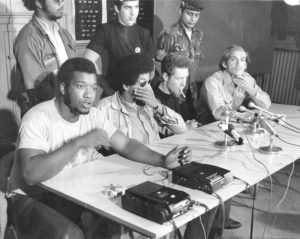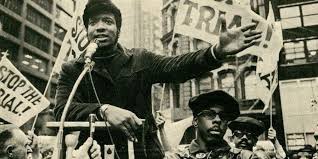The civil rights movement won the abolition of Jim Crow laws. It wasn’t easy. Hundreds of Black women and men gave their lives to make possible this achievement. Martin Luther King, Malcolm X, Medgar Evers, Jimmie Lee Jackson, Clyde Kennard, the Alabama “civil Rights martyrs”… the list is huge. Despite the important triumph that the enactment of the Civil Rights Act in 1964 signified, the truth is that for millions of Black people, life remained a living hell.
Fred Hampton Presente!
Fred Hampton was born on August 30, 1948 in Summit, Illinois and grew up in the Chicago suburbs. His parents were both laborers at the Argo Starch Company. He became politically active in The National Association for the Advancement of Colored People (NAACP). The NAACP was a massive organization but politically devoted to reformism and working within capitalism to fight anti-Black racism. Hampton grew the chapter from a couple of people to 700!
Like many young people of his generation, Hampton became politically radical, motivated by the extreme situation facing Black youth in the city ghettos and joined the Black Panther Party where he came to hold leadership positions. He was the founder of the “Rainbow Coalition”, creating an alliance between the major Chicago gangs, including the Puerto Rican Young Lords and the majority white gang the Young Patriots. His brother Bill Hampton said:
Fred told the people to fight for their rights by any means necessary. He was organizing hospital strikes. He also founded what he called the Rainbow Coalition of poor whites, Blacks, Latinos, Indians and Chicanos in the city of Chicago to fight against oppression. Fred took the Young Lords, a Puerto Rican gang, and the Young Patriots, a white gang from the Uptown area, and made all these groups into a political organization because he was trying to get them to see that racism wasn’t the only problem–that racism was a byproduct of capitalism.
Because of the importance he acquired as a leader of the Black liberation movement, Hampton was targeted by the FBI in 1967 as a threat to the American state. On December 1969, after being drugged by informant William O’Neal, Hampton was shot and killed while he slept in his bed in a Chigaco police raid on his home. Black Panther Mark Clark was also murdered. Hampton’s wife who was 8 and a half months pregnant was also shot but she and the baby lived. The raid was led by Cook County State’s Attorney’s Office and the FBI. Hampton was just 21 years old.

Hampton was part of a fearless generation of young Black men and women who identified that racism and capitalism go hand in hand. He was a young man who gave revolutionary ideas to poor young people of color who suffered from racial violence, economic segregation, and police brutality in their daily lives.
Fred Hampton in Context: the radical Black youth of the ghettos
By the end of the 1970s, the structural conditions of racial segregation had changed little to nothing. In the country’s major capitals, from Detroit to Chicago, from Los Angeles to Oakland, the conditions of the U.S. ghettos were largely the same. Ghettos formed during the first half of the 20th century. They were the result of the integration of the Black population into industry and redlining laws that segregated poor Black populations. Thousands of Blacks were recruited into the factories as second-class workers, without the rights and benefits of white workers. Many others were left unemployed, without access to housing and the most basic social security. In 1970, about 70 percent of the Black population lived in cities.
By the 40s, most of the white working class had unions and benefits, but to reduce costs factory owners began recruiting African Americans from the South. The goal of recruiting Black workers was to pay lower wages than their white counterparts. The owners were certain that hiring African Americans would probably not result in an interracial resistance of the working class to the general reduction of wages. White supremacism had already wreaked havoc on the consciousness of a good part of the white working class which made possible the emergence of segregated unions.
At the same time, as the Black population migrated to the cities, they found increasing racial violence in the neighborhoods and workplaces. Neighborhood boundaries became racial boundaries.
The government’s response was eminently racist. Housing policies for example, aimed to keep the Black population in poverty by limiting their access to real estate credit and public services. As stated by Aaron J. Howell:
American cities took on what George Clinton would famously call a “chocolate city, vanilla suburbs” pattern. To the extent that any federally backed money went into ghettos, it was mostly put to the task of slum clearance. Many buildings were torn down, some never to be rebuilt, at least not for the purposes of housing. As a result, in many places, rents actually rose in the ghetto as whites moved to the suburbs.
Black people were confined to the worst neighborhoods, while also earning significantly less money than their white counterparts.
Those who most resented the conditions of poverty and racial segregation were women and youth, mostly African Americans but also Puerto Ricans. The state responded to the latent discontent among the Black community with systematic police violence that harassed and murdered Black youth. In the early 1960s, the situation had become unsustainable.
From this milieu emerged Black insurgents like Fred Hampton, and both the Black Panthers Party and other radical organizations were nourished by their energy and rage.
The murderous hand of the FBI
The raid where Fred Hampton was killed was a coordinated action between the Chicago police assigned to State’s Attorney Edward Hanrahan and the FBI.
According to the information revealed during civil court actions, Fred Hampton’s bodyguard William O’Neal was a paid FBI infiltrator. According to G. Flint Taylor Hampton’s assassination occurred “shortly after a J. Edgar Hoover memo ordering that all FBI offices establish a counterintelligence program aimed at “neutralizing” and “crippling” the Panther Party, to “prevent the rise of a Black Messiah who could electrify and unify the militant Black movement.”
The media and the State’s Attorney claimed that the deaths were the result of a gunfight between the Chicago police and members of the Black Panther Party. However “The physical evidence soon exposed the claims of a “shootout” that were made by Hanrahan and his men to be blatant lies, and that the murderous reality was that the police fired nearly 100 shots while the Panthers fired but one.” After the initial hail of bullets Hampton was still alive. Noticing this the police shot more bullets saying “He’s good and dead now”.
The blatant lies spread by the state attorney’s office were the first of a massive cover-up operation designed to conceal the role played by the FBI in the CounterIntelligence Program (COINTELPRO) from 1956 until 1971.
The COINTELPRO was created more than anything, in the words of J. Edgard Hoover to “expose, disrupt, misdirect, discredit, and otherwise neutralize” the African American organizations. Before Hampton and Clark were assassinated there were several shootings the police orchestrated to pit groups against each other. Fights within the BPP and among other political groups weakened their ability to organize. When law enforcement and the FBI saw their vulnerable state-they murdered Hampton. Hampton was assassinated because he was able to forge working class solidarity between black, brown and white youth as well as between rival gangs of the same ethnicity. When Hampton and Bobby Lee visited the Young Patriots in Appalachia, the police attempted to detain and arrest the Panthers. The Young Patriots confronted the police and forced them to back off. Bigotry and disunity are the most well-worn tools of US capitalist oppression. When class unity is obtained the small amount of actual capitalists can be overtaken.
In addition to this work, Hampton also developed “Serve the People” programs such as Free Breakfast for Children. Other programs were for healthcare services. The Chicago chapter of the BPP also organized testing for sickle cell anemia-a disease that disproportionately affects Black people and had been largely ignored by the medical community until then. The Panthers also had free clinics and made door to door medical service calls. These programs were seen by Hoover and the capitalist state as a threat.
Fred Hampton conversely also knew that capitalism in the Black community was poisonous. A well maintained myth used by capitalist society is that everyone can become a capitalist and that working class people should strive to become capitalists themselves rather than fighting capitalist oppression. Hampton most articulately explained that Black capitalism would also mean the exploitation of Black people. He pointed out neocolonialism in Africa being Black capitalists playing the same exploitative role as white capitalists. Hampton famously said, “We don’t fight fire with fire we fight fire with water. We don’t fight white capitalism with Black capitalism. We fight capitalism with international proletarian solidarity.” Hampton made clear bigotry and racism in particular are an essential part of the functioning of capitalism and imperialism.
The role played by the FBI against Black radicalism, is the clearest example that the American state feared this Black youth who, in addition to their militancy and radicalism, understood the class character of the struggle for Black liberation. The state responded with the most bloody repression possible because the most advanced sectors of the Black youth of the sixties had established an indissoluble link between the struggle for Black liberation and the struggle against imperialism. Hampton convinced sectors of the Chicago working class and oppressed people to shed some of the most established myths about capitalism: bigotry and the myth of becoming a capitalist as a method out of racism. For that, the state assassinated him.
Fred Hampton lives in the fight for Black liberation
Police violence, racism, mass incarceration, and structural poverty continue to plague millions of Black people in America. Just a few weeks ago, the second march against police violence on the subway took place in New York City. The struggle for Black liberation must be embraced by the whole multicultural U.S. working class and the youth who claim to be socialists. At the same time, the only way to uproot racism is to put an end to this system that reproduces and fosters it. It is indispensable for the new generation of young people to critically recover the most revolutionary aspects of figures like Fred Hampton and lay the foundations for the struggles to come. He was murdered by the state because he was a threat to that state, but his strength accompanies us still today. In Ferguson, in Baltimore in every daily struggle against this system of exploitation and oppression, Hampton’s legacy lives on.
Fred Hampton, until socialism always!












